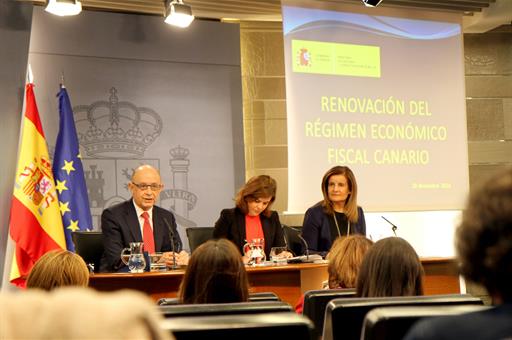Council of Ministers
Government approves Extraordinary Plan to Activate Employment
Council of Ministers - 2014.12.19
Moncloa Palace, Madrid
The Council of Ministers approved a Royal Decree-Law regulating the Extraordinary Programme to Activate Employment, that responds to the commitment entered into between the President of the Government and the social stakeholders on 15 December based on the "Proposal agreement for tripartite negotiations to enhance economic growth and job creation", of 29 July.
The Vice-President of the Government, Soraya Sáenz de Santamaría, underlined that the main philosophy behind the scheme is commitment, effort and shared responsibility between the regional public employment services and the end beneficiaries. "The former are those entrusted with guiding the unemployed, preparing their itinerary and monitoring their progress. The beneficiaries must take advantage of the opportunities offered to them by the employment services, contributing between all concerned to their return to the job market", she specified.
Soraya Sáenz de Santamaría added that, on a complementary basis, economic aid will be offered to help them take maximum advantage of the measures and opportunities to return to the job market".
Beneficiaries of the scheme and 426-euro aid
The Minister for Employment and Social Security, Fátima Báñez, thanked the social stakeholders and the regional governments for their "responsibility and generosity" in implementing "such a novel plan for our country".
Fátima Báñez outlined that the scheme is aimed at the long-term unemployed with family responsibilities that are registered as job seekers at 1 December 2014 and have been registered for at least 12 of the preceding 18 months prior to their request. Furthermore, they must have used up all available unemployment aid, benefits and subsidies, not have access to other forms of aid and not have exceeded the habitual income thresholds for these forms of aid.
 Pool MoncloaThe beneficiaries, who will receive a monthly benefit of 426 euros for six months, will be under an obligation to actively seek employment. The minister pointed out that if, during their participation in the scheme, they receive "a suitable job offer or a training course, they must accept it".
Pool MoncloaThe beneficiaries, who will receive a monthly benefit of 426 euros for six months, will be under an obligation to actively seek employment. The minister pointed out that if, during their participation in the scheme, they receive "a suitable job offer or a training course, they must accept it".
This aid will be compatible, for up to five months, with a job in the private sector. The business owner will discount the amount of the economic aid from the salary.
Fátima Báñez explained that the unemployed may present their applications to join up to the scheme between 15 January 2015 and 15 April 2016. The government calculates that more than 400,000 people will benefit under this scheme, that will cost between 1 billion and 1.2 billion euros and will increase the coverage rate of unemployment benefits and subsidies by up to 65%.
Sustained employment growth
During her speech, the minister highlighted that in the last year, some 400,000 people have joined the job market and 300,000 have abandoned the unemployment lists. "We are faced with a new reality in the job market, and for the first time during the whole six-year crisis, net employment will be created in 2014".
Moreover, she reported that "in the second quarter of 2014, employment growth equivalent to full-time work was seen for the first time in our country following 23 consecutive quarters of decline".
Fátima Báñez added that moderate growth in the economy reflects quickly in job creation. "The economy is growing at an annual rate of 1.6% and full-time employment, in national accounting terms, is growing at 1.4%. This has not taken place in the recent economic history of our country".
Job maintenance following interruption in activity
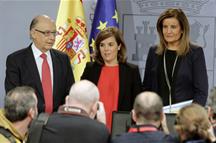 Pool MoncloaThe government has approved a special aid for companies that maintain jobs following a situation of force majeure that obliges them to interrupt their activity, suspend contracts or reduce the working day. This aid is included in the Royal Decree-Law regulating the Extraordinary Scheme to Activate Employment.
Pool MoncloaThe government has approved a special aid for companies that maintain jobs following a situation of force majeure that obliges them to interrupt their activity, suspend contracts or reduce the working day. This aid is included in the Royal Decree-Law regulating the Extraordinary Scheme to Activate Employment.
The General Treasury of the Social Security will offer a 100% exoneration from corporate National Insurance quotas accrued for workers for a period of 12 months per worker, extendable for another 12 months.
Fátima Báñez specified that companies must commit to reinvesting in starting-up their activity under similar conditions to that prior to the situation of force majeure, in addition to maintaining all the job positions.
The Vice-President of the Government asserted that as a result of this measure, a solution is offered to situations leading to cases such as that of Campofrío, whose factory in Burgos recently caught fire.
In regard to this incident, when asked about possible aid to rebuild the factory, Soraya Sáenz de Santamaría pointed out that various government departments are holding talks with the Regional Government of Castile Leon and with company executives so that, given its interest in maintaining its activity and job positions, the company can receive tax breaks, low interest loans and ICO credit facilities. "We are going to ensure that this company, which is so essential for Burgos and the surrounding area, can maintain one or two plants and that its workers are not prejudiced".
New Economic-Tax Regime in Canary Islands
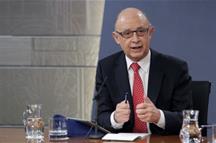 Pool MoncloaThe Council of Ministers approved an amendment to the Economic-Tax Regime (Spanish acronym: REF) in the Canary Islands. According to Soraya Sáenz de Santamaría, the new REF "will ensure more tax breaks to help boost growth and economic development• in the islands, as well as "job creation, which is the main objective of this government's actions".
Pool MoncloaThe Council of Ministers approved an amendment to the Economic-Tax Regime (Spanish acronym: REF) in the Canary Islands. According to Soraya Sáenz de Santamaría, the new REF "will ensure more tax breaks to help boost growth and economic development• in the islands, as well as "job creation, which is the main objective of this government's actions".
The new regulation will come into force for the period 2015-2020. The Decree-Law will be submitted to the Regional Parliament of the Canary Islands to draw up a regulatory report prior to ratification by Parliament, explained the Vice-President of the Government, who highlighted the "close collaboration" between the Minister for the Treasury and the Regional Government of the Canary Islands and the "intense negotiations" carried out with the European Commission in order to receive its go-ahead.
Employment and diversification
The Minister for the Treasury and the Public Administration Services, Cristóbal Montoro, pointed out that the Canary Islands has always had a special regime on tax matters but the new regime approved on Friday is the "most ambitious" and "the one with the most tax incentives" ever seen. In his opinion, it is also an example of the fact that "we live in a country with these particular features" and that "from these differences we can make move forward together".
The main new feature of the REF in the Canary Islands is the boost to employment. "We are even fostering the fact that new investments are not necessary to help fiscally drive job creation", underlined Cristóbal Montoro. The other keys to the system are the diversification of economic activity and investment in West Africa.
As regards the Canary Islands Special Zone, actions by institutions are harnessed throughout the island territory, the number of activities to be carried on is increased - such as drones, high-performance sports, machine repairs and water desalination plants - and major new tax breaks are created.
With the aim of fostering the use of the Canary Islands as a platform for investment in West Africa, a Corporate Income Tax deduction of up to 15% is created for small- and medium-sized enterprises and in Personal Income Tax for business owners. For the Minister for the Treasury, in addition to providing a response to a time-long aspiration, this is also a "commitment" from Spain to the economic development of this part of Africa.
Finally, the tax break for technological innovation is increased from 32% to 45% in the Canary Islands. The Vice-President of the Government pointed out that the decree-law includes an extension of the specific remuneration regime for renewable installations for one year.
PIMA Transport Plan
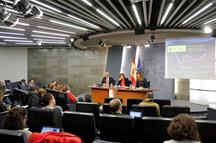 Pool MoncloaThe Council of Ministers approved the Plan to Boost the Environment (PIMA) in the Transport sector, with direct aid for an amount of 4.7 million euros. The plan includes aid to scrap buses and goods transport vehicles with a traction capacity of more than 3.5 tonnes of maximum authorised weight, manufactured more than eight years ago.
Pool MoncloaThe Council of Ministers approved the Plan to Boost the Environment (PIMA) in the Transport sector, with direct aid for an amount of 4.7 million euros. The plan includes aid to scrap buses and goods transport vehicles with a traction capacity of more than 3.5 tonnes of maximum authorised weight, manufactured more than eight years ago.
The amount of the aid varies according to the weight of the vehicle, from 1,500 euros for lorries weighing between 3.5 and 7.5 tonnes, and up to 3,000 euros for lorries weighing over 16 tonnes. As regards buses, the aid will always amount to 3,000 euros.
The Vice-President of the Government announced that requests for aid can be presented up to 1 October 2015, and calculates that under this plan "we can remove 1,800 obsolete industrial vehicles from our highways". She also announced that the European Investment Bank plans to approve a credit facility for those owners that decide to buy a new lorry or bus, having handed over their vehicle under this plan.
Lower electricity bills
 Pool MoncloaOn another note, the Vice-President of the Government asserted that household electricity bills have fallen by 8% in the last two years according to a report presented by the Minister for Industry on Friday at the Council of Ministers. Specifically, the reduction was 3.7% in 2013, with an estimate of 4.9% for 2014 compared with an average annual increase of 7.2% between 2004 and 2012.
Pool MoncloaOn another note, the Vice-President of the Government asserted that household electricity bills have fallen by 8% in the last two years according to a report presented by the Minister for Industry on Friday at the Council of Ministers. Specifically, the reduction was 3.7% in 2013, with an estimate of 4.9% for 2014 compared with an average annual increase of 7.2% between 2004 and 2012.
As regards gas, the average bill increased annually by 6.2% in this eight-year period and by 5.7% in 2013, "but only by 0.5% in 2014", she pointed out.
According to this report, the energy bill will also drop for industrial consumers this year; by 1.5% for electricity and by 2.4% for gas.
Soraya Sáenz de Santamaría attributed this change in trend of prices to the electricity reform, which has also allowed "the system deficit to be corrected", thus guaranteeing "its economic and financial sustainability". The forecast for 2015 is for the system "to maintain this balance, without raising tariffs for consumers", she added. "We are working to ensure supply at competitive prices, to help drive our industry in a secure and sustainable manner", she stated.
State's Attorney General
The Council of Ministers accepted the resignation of the State's Attorney General, Eduardo Torres-Dulce, and proposed Consuelo Madrigal Martínez as a candidate to the General Council of the Judiciary.
When asked about his resignation, the Vice-President of the Government referred to the statement made by the State's Attorney General - due to personal reasons - and remarked that this decision falls within the exercise of the independence of the Public Prosecutor's Office: "A sound institution with a well qualified group of prosecutors".
In this regard, she stressed that the choice of Consuelo Madrigal Martínez is as a result of "her own professional track-record". She highlighted her "absolutely irreproachable curriculum" and asked for "her to be allowed to do her work before anyone judges her".
Current affairs
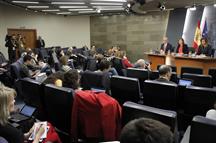 Pool MoncloaIn light of the rapprochement between the United States and Cuba, the Vice-President of the Government referred to the work that the government has been undertaking vis-à-vis the European Union to foster greater respect for human rights on the island and expressed her confidence in the actions of the Cuban authorities translating into "well-being for the people".
Pool MoncloaIn light of the rapprochement between the United States and Cuba, the Vice-President of the Government referred to the work that the government has been undertaking vis-à-vis the European Union to foster greater respect for human rights on the island and expressed her confidence in the actions of the Cuban authorities translating into "well-being for the people".
As regards the possibility of extending the period for re-programming television channels, Soraya Sáenz de Santamaría stated that the Ministry of Industry is holding talks with the sector to study this possibility and, at any event, resolve the necessary adaptations "in the best way possible".
Cristóbal Montoro explained the new financing mechanism for the regional authorities that the government will shortly propose to the Fiscal and Financial Policy Council.
This is a procedure of "pooling debt" that will not only be to the benefit of the regional governments that have signed up to the Regional Liquidity Fund, but also to the other regional governments and local authorities; this will allow "the burden of financial costs to be reduced" and will give "greater financial facilities in repaying outstanding debts to the State". She remarked that this has been possible as a result of the favourable development of the economy now that "Spain is receiving financing under better conditions".





